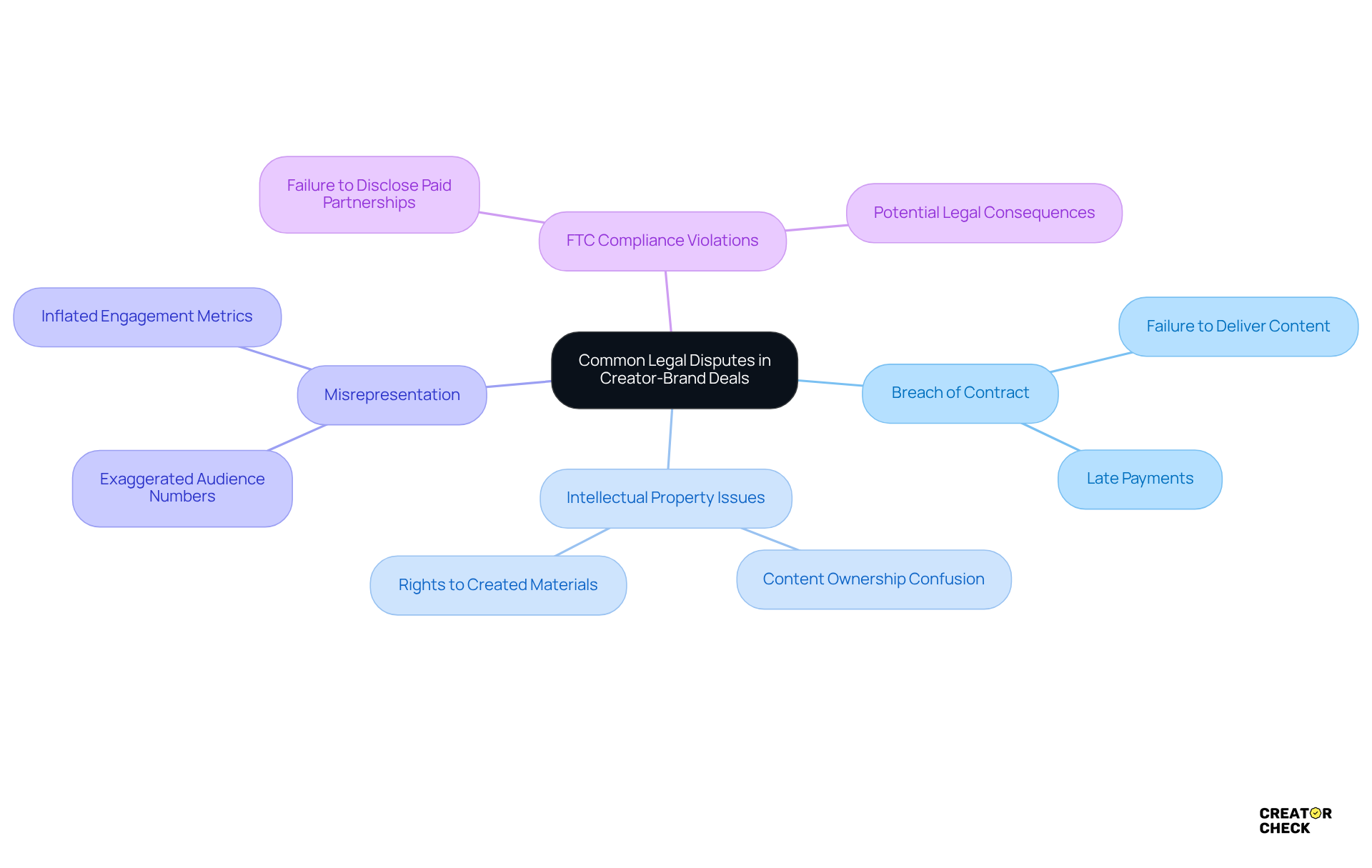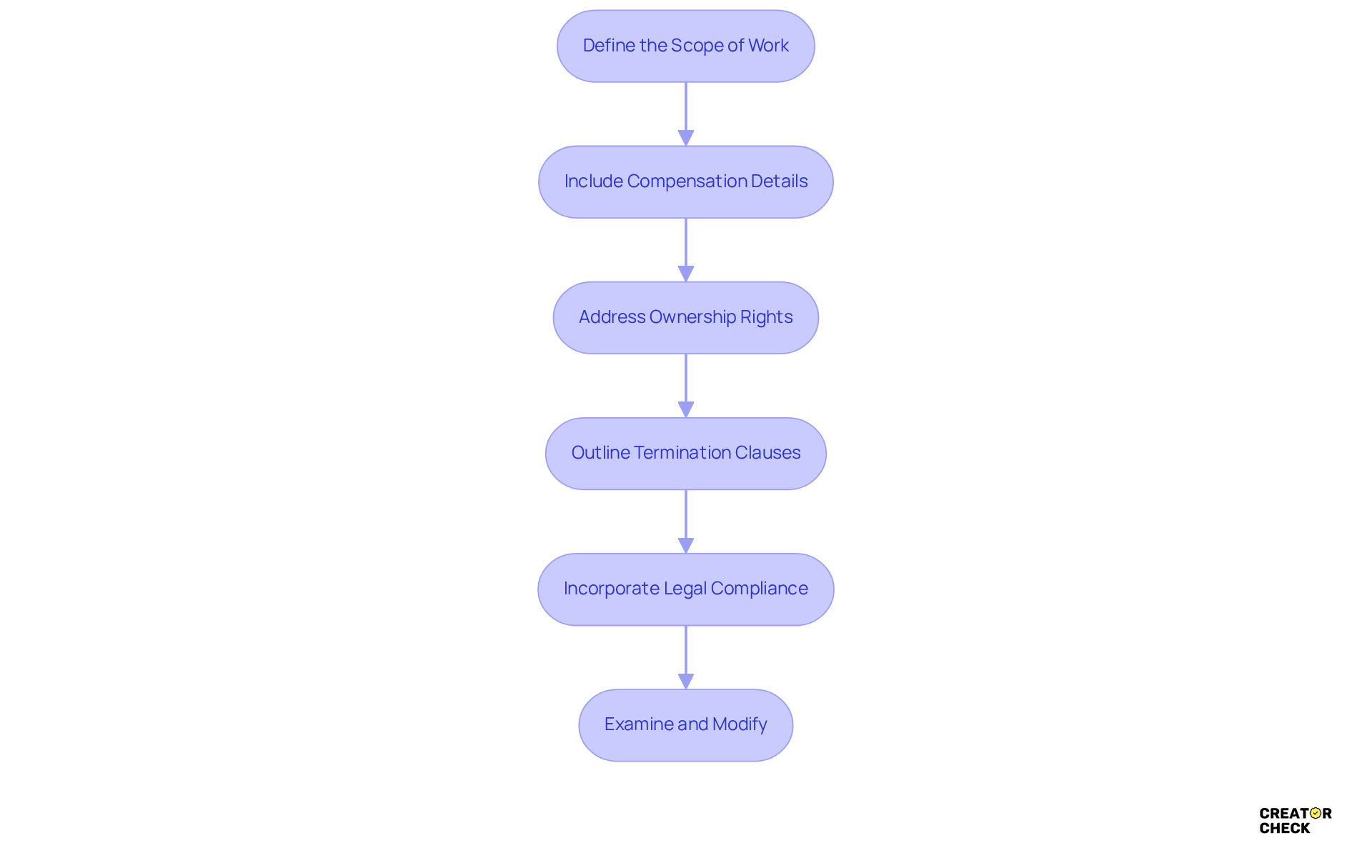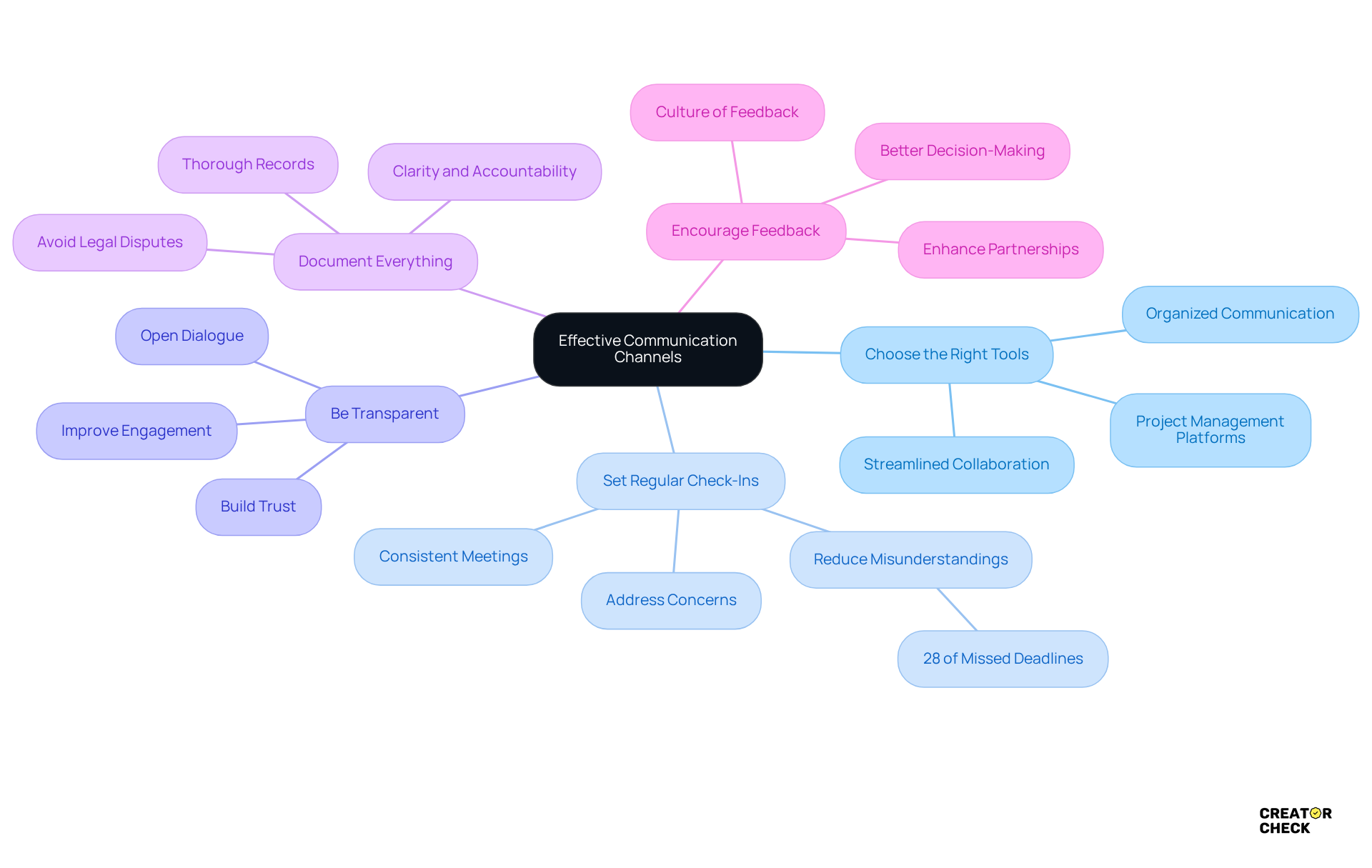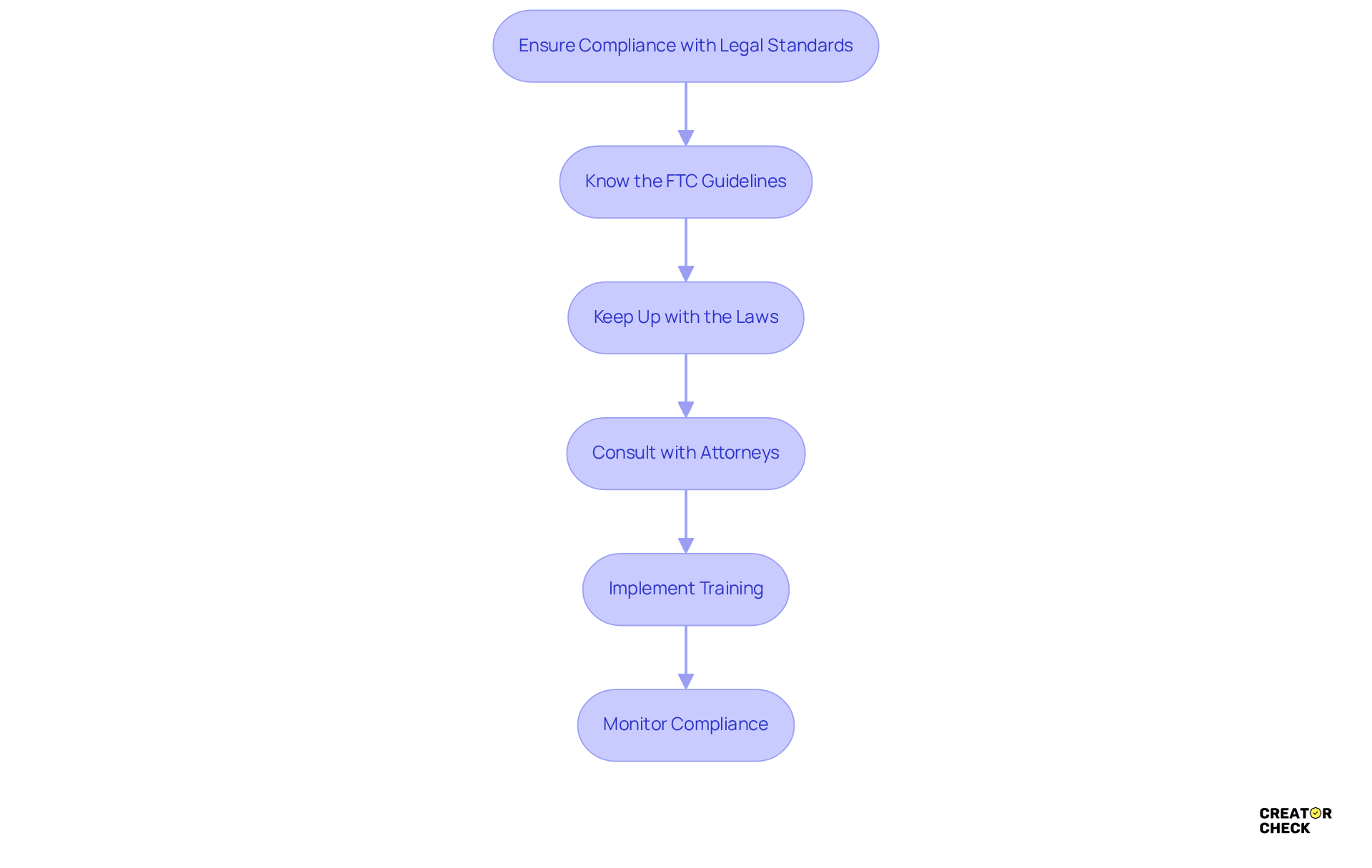Overview
So, what’s the big question here? It’s all about how creators and brands can steer clear of legal disputes in their deals. The article lays out four key steps to help you out:
- Draft clear contracts
- Establish effective communication
- Ensure you’re compliant with legal standards
- Get to know the common legal disputes that can pop up
It’s all about being proactive! By keeping responsibilities clear and communicating regularly, you can really cut down on misunderstandings and potential conflicts. Pretty neat, right?
Introduction
The rise of influencer marketing has really shaken up how brands partner up, but with this change comes a bunch of potential legal headaches. Creators and brands need to navigate a tricky maze of contracts, compliance, and communication to steer clear of disputes that could throw a wrench in their collaborations.
In this article, we’ll explore some essential strategies for sidestepping legal conflicts in creator-brand deals. We’ll share tips on:
- Drafting effective contracts
- Setting up clear communication channels
So, how can both parties keep their partnerships smooth and legally sound in a world where regulations are always shifting?
Understand Common Legal Disputes in Creator-Brand Deals
In the world of influencer marketing, there are a few common legal disputes that can pop up. Let’s break them down:
- Breach of Contract: This happens when one party doesn’t hold up their end of the deal. For example, if a creator doesn’t deliver the content they promised, or if a brand is late with payments, that’s when disputes can arise.
- Intellectual Property Issues: Sometimes, there’s confusion over who owns the content created during the collaboration. It’s super important to clarify who gets the rights to photos, videos, and other materials produced.
- Misrepresentation: If a creator exaggerates their audience or engagement numbers, brands might feel misled, which could lead to some serious discussions.
- FTC Compliance Violations: Not disclosing paid partnerships can land you in hot water with the Federal Trade Commission (FTC).
By keeping these potential disputes in mind, both creators and brands can take proactive steps for avoiding legal disputes in creator-brand deals. So, what does this mean for you? It’s all about staying informed and ensuring that everyone is on the same page!

Draft Clear and Comprehensive Contracts
To draft a clear and comprehensive contract, here are some essential steps you should follow:
-
Define the Scope of Work: Start by clearly outlining the creator's responsibilities. What type of content will they produce? What are the deadlines? And what specific messaging requirements need to be met? This clarity is essential for avoiding legal disputes in creator-brand deals and ensures both parties are on the same page.
-
Include Compensation Details: Specify the payment terms—amounts, payment methods, and timelines for payment. Having clarity in compensation is essential for avoiding legal disputes in creator-brand deals. Did you know that over 65% of brands now use formal agreements for collaborations? That really shows how the industry is shifting towards organized teamwork.
-
Address Ownership Rights: Make sure to clearly state who owns the content created during the partnership. Also, outline any rights to use it in the future. This is key for protecting both the brand's and the creator's interests, particularly in the context of avoiding legal disputes in creator-brand deals, as marketing through social media personalities continues to evolve.
-
Outline Termination Clauses: Include conditions under which either party can terminate the agreement, along with any notice requirements. This provision is vital for managing expectations and plays a key role in avoiding legal disputes in creator-brand deals if a smooth exit is needed.
-
Incorporate Legal Compliance: Don’t forget to include clauses that address compliance with FTC guidelines and other relevant laws. As the influencer marketing landscape evolves, staying compliant is essential for avoiding legal disputes in creator-brand deals.
-
Examine and Modify: Before wrapping things up, both sides should carefully assess the contract. It might be worth seeking professional advice to ensure everything is covered. Tailored agreements are becoming increasingly important for high-value collaborations, as they are essential for avoiding legal disputes in creator-brand deals. As Davide Demarchi observed, "While they may appear formal in a field founded on genuineness and connections, contracts for social media personalities ultimately advantage both sides by setting clear expectations, safeguarding interests, and creating a basis for successful collaborations."
By following these steps, agency representatives can create robust agreements that set clear expectations and protect legal interests. Ultimately, this fosters successful collaborations. So, what does this mean for you? It’s all about building strong partnerships that work for everyone involved!

Establish Effective Communication Channels
To create effective communication channels in influencer partnerships, let’s explore some best practices that can really make a difference:
-
Choose the Right Tools: Think about using project management and communication platforms like Slack, Trello, or Asana. These tools not only help streamline collaboration but also keep everyone organized, ensuring that all parties stay informed and aligned throughout the partnership.
-
Set Regular Check-Ins: It’s a good idea to schedule consistent meetings or updates to talk about progress, address any concerns, and make necessary adjustments. Regular communication can significantly reduce misunderstandings—after all, they account for 28% of missed deadlines! This way, you’ll enhance overall project efficiency.
-
Be Transparent: Foster an environment where open dialogue about expectations, challenges, and feedback is the norm. Transparency builds trust and collaboration, which are essential for successful influencer marketing initiatives. Organizations that prioritize effective communication often see improved engagement and project outcomes.
-
Document Everything: Keep thorough records of all communications, agreements, and changes. This practice guarantees clarity and accountability, which are essential for avoiding legal disputes in creator-brand deals. Documentation serves as a handy reference point for everyone involved, reinforcing commitments and expectations.
-
Encourage Feedback: Create a culture where both parties feel comfortable sharing feedback. This not only enhances the partnership but also boosts the overall effectiveness of the collaboration. Engaging stakeholders early in projects can lead to better decision-making and uncover important perspectives that might influence project success.
So, what does this mean for you? By implementing these practices, you’ll not only strengthen your partnerships but also pave the way for more successful influencer campaigns. Let’s dive into how you can start putting these ideas into action!

Ensure Compliance with Legal Standards and Regulations
To ensure you're playing by the rules in influencer marketing, it's essential to adopt some best practices:
-
Get to Know the FTC Guidelines: It’s super important to understand what the Federal Trade Commission (FTC) requires when it comes to disclosures and endorsements. Influencers need to be clear about any paid relationships—using simple terms like 'ad' or 'sponsored' is a must. Ignoring these guidelines can lead to hefty penalties. Just look at the brands that faced legal trouble for misleading consumers! And don’t forget, the FTC updated its guidelines in August 2023 for the first time in 14 years, so staying informed is key.
-
Keep Up with the Laws: Laws and regulations are always changing, so make it a habit to review them regularly. You’ll want to stay on top of evolving data privacy laws and advertising standards that could affect your campaigns. The updated guidelines really stress transparency and consumer protection, which are more important than ever in today’s marketing world.
-
Consult with Attorneys: It’s a smart move to work with professionals who specialize in influencer marketing. They can help ensure that all your contracts and practices are above board. This is especially crucial since 51% of marketers plan to increase their budgets for disclosure efforts. Getting expert advice can really help you navigate those tricky regulations.
-
Implement Training: Offering training for creators on their responsibilities and best practices is a great idea. This training should highlight the importance of clear disclosures and the potential fallout from non-compliance. It’s all about fostering a culture of accountability among influencers.
-
Monitor Compliance: Regularly checking your campaigns to ensure they meet regulatory standards is a must. This means keeping an eye on influencer content to make sure it aligns with FTC guidelines and addressing any issues right away. With 93% of marketers noting deceptive endorsement practices among competitors, being proactive about compliance can save you from reputational damage and disputes. Plus, remember that the FTC can impose civil penalties on violators, so it’s serious business!
In conclusion, by following these best practices, you can navigate the complexities of influencer marketing while minimizing the risks of non-compliance. The financial fallout from failing to disclose partnerships can be significant—just ask the tea company that had to shell out $1 million for misleading consumers. So, prioritizing compliance not only protects your brand but also helps build trust with your audience.

Conclusion
Navigating the world of creator-brand deals can be quite the adventure, right? It really helps to have a solid grasp of potential legal disputes and the proactive steps to steer clear of them. By keeping an eye out for common issues like:
- Breach of contract
- Intellectual property disputes
- Misrepresentation
- FTC compliance violations
both creators and brands can team up to create successful partnerships. And let’s not forget how crucial clear communication and comprehensive contracts are; they lay the groundwork for a smooth collaboration.
So, what are some key strategies to consider? Well, drafting precise contracts that clearly outline:
- The scope of work
- Compensation details
- Ownership rights
- Legal compliance
is a great start. Plus, establishing effective communication channels—using the right tools, having regular check-ins, and being transparent—can really strengthen those relationships and cut down on misunderstandings. Staying updated on changing regulations and seeking professional legal advice is also a smart move to ensure compliance and protect everyone involved from potential disputes.
Ultimately, these practices are about more than just legal protection; they’re about building trust and nurturing long-lasting relationships in the influencer marketing space. Embracing these steps not only helps mitigate risks but also boosts the overall effectiveness of creator-brand collaborations. By prioritizing clear agreements and open communication, everyone can create thriving partnerships in this complex and ever-evolving environment. Isn’t that what we’re all aiming for?
Frequently Asked Questions
What are common legal disputes in creator-brand deals?
Common legal disputes include breach of contract, intellectual property issues, misrepresentation, and FTC compliance violations.
What does breach of contract mean in influencer marketing?
Breach of contract occurs when one party fails to fulfill their obligations, such as a creator not delivering promised content or a brand being late with payments.
What are intellectual property issues in creator-brand collaborations?
Intellectual property issues arise when there is confusion over who owns the content created during the collaboration, such as rights to photos and videos.
How can misrepresentation occur in creator-brand deals?
Misrepresentation can occur if a creator exaggerates their audience or engagement numbers, leading brands to feel misled.
What are FTC compliance violations?
FTC compliance violations happen when paid partnerships are not disclosed, which can result in legal consequences from the Federal Trade Commission.
How can creators and brands avoid legal disputes?
Creators and brands can avoid legal disputes by staying informed and ensuring clear communication about expectations and obligations in their agreements.




